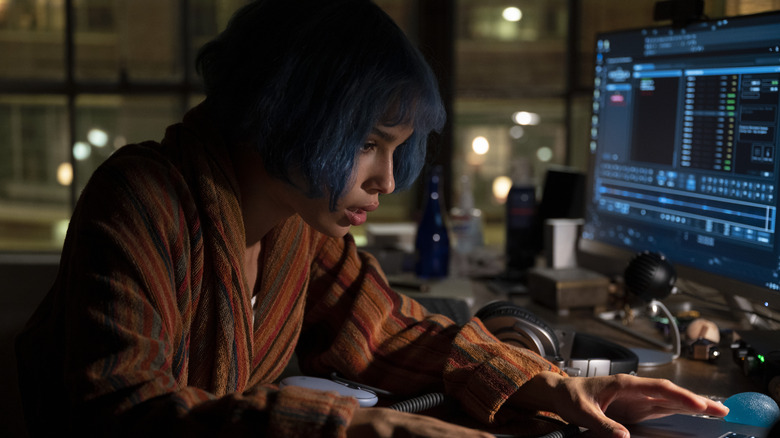Kimi Review: Zoe Kravitz Finds Herself In A Digital Rear Window Situation In This Steven Soderbergh Thriller
Steven Soderbergh grafts our modern-day loss of privacy to a "Rear Window"-style narrative with "Kimi," a slick, quick thriller that goes down smooth, like top-shelf bourbon at a discount price. Working with a script from David Koepp, Soderbergh brings his fast and loose style to this story of digital eavesdropping in the midst of the pandemic, creating a blend of paranoid thriller and high-tech malevolence. Many will probably say this is a movie about the horrors of technology — but I don't think that's what's happening here. Instead, I think Soderbergh is merely using the trappings of this un-private world in service of a cracking old-school thriller (that just happens to be using new tech). And there's nothing wrong with that. By all means, give us more competently made, fast-paced, 90-minute exercises in style. Especially if they're being made by Soderbergh.
In "Kimi," Angela Childs (Zoë Kravitz) works for Amygdala, a tech company that has produced an Amazon Echo-like device known as Kimi. Like with the Echo, all you need to activate the device is to call out a name — in this case, Kimi — at which point your virtual assistant's cheerful voice will reply, "I'm here!" And, just like the Echo, there are privacy issues to consider (a real-life case involving an Arkansas murder trial that hinged on evidence from an Amazon Echo is briefly mentioned here). Angela's job title is "Voice Stream Interpreter," which means she literally listens to audio recordings of customers' Kimi requests, all in the name of improving the device. The head of Amygdala, played by Derek DelGaudio, insists this isn't the same as spying on people, and to ensure privacy, all the audio recordings Angela gets are anonymous and seemingly untraceable. On top of that, it seems like Angela's employers have no interest in getting too involved with personal matters. "Our policy is it is none of our business," one of them says.
Rather than existing in some weird bubble where COVID-19 never happened, "Kimi" is very much set in the midst of the pandemic. We see people on the streets wearing masks, and Angela is constantly using hand sanitizer. She's also averse to leaving her spacious Seattle apartment, but not entirely because of the virus. Angela is suffering from agoraphobia — a condition that we learn was slowly improving for Angela, only for the pandemic to come along and make it worse. Now, when she tries to leave her apartment she descends into panic, and it's as if there's a forcefield keeping her in place. Her only connections with the outside world are via online text or video calls — although there's also Terry (Byron Bowers), a guy living across the street who occasionally comes over to Angela's place for some quick sex. Terry would like to see more of Angela and even take her out on a date. But Angela, who appears to have OCD along with her agoraphobia as she strips the bedsheets immediately following coitus, doesn't think that's possible.
For the first half of the film, Soderbergh keeps us firmly rooted within Angela's apartment, which is meticulously decorated to the point where it looks like it's been ripped from a Pottery Barn catalog. The camera will occasionally point out Angela's rather large windows, allowing us to spy on her neighbors and look at the outside world, which still seems bright and vibrant despite the pandemic. And while other people come and go, usually via video messages, Kravitz is our guide here; our main focus. She plays Angela as likable, but also obsessive and nervous — and that's before she uncovers what she thinks might be a murder.
Simple But Effective
"Trust me, I know bad. I used to moderate for Facebook," Angela says at one point, but she's still unprepared for what sounds like a woman screaming, and possibly dying, on one of the Kimi recordings. It's at this point that "Kimi" starts to require a heavy dose of suspension of disbelief, but Soderbergh is so good at sweeping us along that it's easy to accept some of the huge logic jumps that follow. Angela considers the cops untrustworthy (and who can blame her?), so she's not quick to call them and report what might be a crime. Instead, she works her way up the corporate ladder, trying to get the higher-ups at Amygdala. Soon, Angela has reached a point where she feels she needs to take the audio file directly to the Amygdala offices herself (instead of, you know, sending it via e-mail, which would be so much easier). This means she has to finally leave her apartment, and here Soderbergh switches gears.
The minute Angela steps out of her safe haven the entire world changes via how Soderbergh, who once again serves as his own cinematographer, shoots it. The camera angles become tilted and disorienting, and Kravitz's movements seem to be slightly sped-up as if she's in a kind of semi-fast-motion. And then things get even weirder, allowing Soderbergh to shift from a somewhat simple "Rear Window"-style thriller into the world of elaborate corporate espionage and full-blown paranoia, complete with powerful, amoral people willing to do whatever it takes to stay ahead. It reminded me not just of Hitchcock's stylish work but also that of Hitchcock acolyte Brian De Palma; "Blow Out," with its main character listening in to sounds of murder, seems like a huge influence here. As does De Palma's earlier twisty horror pic "Sisters," a film fond of images of blank, non-descript apartment exteriors, and the potentially nefarious things going on behind the walls and windows.
"Kimi" almost never slows down at this point, with Kravitz sprinting from one location to another, growing more and more frantic by the minute. It leads to a dynamite chase sequence through a computer server room and builds towards a grand finale with bursts of violence and tension so thick it begins to grow suffocating. But most refreshing is how Soderbergh keeps this all relatively simple. Yes, the plot grows more elaborate and fantastical, but the film itself has its feet firmly on the ground, and Soderbergh seems solely committed to giving us a quick, mid-budget, ultra-sturdy thriller with no pretensions — the type Hollywood doesn't really make anymore. This isn't the best or even most-memorable film on Soderbergh's resume, but it is a film that does exactly what it sets out to do. Best of all, the filmmaker doesn't tack on a hacky message about how we should all unplug from our devices — because let's face it, we all know that's not happening at this point.
/Film Rating: 7 out of 10

